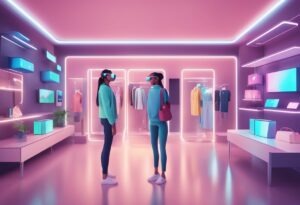The concept of metaverse retail stores has been gaining traction in recent years, with companies exploring the potential of virtual shopping experiences. The metaverse is a term used to describe a shared virtual space where people can interact with each other and digital content in real-time. Retailers are now looking to create immersive shopping experiences in the metaverse, where customers can browse and purchase products in a virtual environment.
Many well-known brands, including Adidas, Burberry, Gucci, and Nike, have already set up virtual stores in the metaverse. These companies are leveraging cutting-edge technology to create engaging shopping experiences that blur the lines between physical and digital retail. In the metaverse, customers can interact with products in a way that’s not possible in the physical world, such as trying on virtual clothes or testing out products in a simulated environment.
The metaverse presents a unique opportunity for retailers to create new revenue streams and reach a wider audience. With the rise of virtual reality and the increasing popularity of online shopping, it’s no surprise that retailers are exploring the potential of metaverse retail stores. As technology continues to advance, it’s likely that we’ll see more companies embrace this new frontier of retail and create even more innovative shopping experiences for customers.
Understanding Metaverse Retail Stores
The concept of virtual reality has been around for a while, but only recently has it become more accessible and practical. The metaverse is an extension of this concept, allowing individuals to create and interact with virtual spaces that can be accessed from anywhere. The metaverse has the potential to revolutionize the retail industry by creating a new platform for shopping experiences.
Key Technologies in Metaverse Retail
Metaverse retail stores rely on a few key technologies to create a seamless and immersive shopping experience. These technologies include virtual reality (VR) and augmented reality (AR) which allow customers to interact with products in a more realistic and engaging way. Blockchain technology is used to create secure transactions and ownership of virtual assets.
How Metaverse Retail Stores Work
Metaverse retail stores work by creating a virtual space where customers can browse and purchase products. These stores can be accessed through VR headsets or other devices that allow for a more immersive experience. Customers can interact with products in a similar way to physical stores, but with the added benefit of being able to view products in different environments and settings. Transactions are made using cryptocurrency, which is secured through blockchain technology.
Metaverse retail stores are an exciting new development in the retail industry. They offer a new way for customers to shop and interact with products, while also providing retailers with a new platform to sell their products. With the continued development of technology, metaverse retail stores are poised to become a significant part of the retail landscape.
The Rise of Metaverse Retail
The metaverse is an emerging virtual world that is rapidly changing the way retailers interact with customers. The pandemic has accelerated the shift towards online shopping, and retailers are now looking for new ways to engage with customers in a more immersive and interactive way. The metaverse provides an opportunity for retailers to create a virtual shopping experience that is more engaging, interactive, and personalized than traditional online shopping.
Impact of the Pandemic on Retail
The pandemic has had a significant impact on the retail industry, with many retailers struggling to survive. The shift towards online shopping has accelerated, and retailers are now looking for new ways to engage with customers in a more meaningful way.
The metaverse provides an opportunity for retailers to create a virtual shopping experience that is more engaging and interactive than traditional online shopping.
Case Studies: Nike, Adidas, and Burberry
Nike, Adidas, and Burberry are three brands that are already experimenting with the metaverse. Nike has created a virtual store in the metaverse where customers can browse and purchase products in a more immersive and interactive way. Adidas has also created a virtual store in the metaverse, where customers can try on shoes and clothing in a virtual environment. Burberry has created a virtual store in the metaverse where customers can explore the brand’s latest collection and interact with other customers.
These brands are using the metaverse to develop awareness, engagement, and loyalty. They are experimenting with new business models and using the early metaverse to learn about customer behavior. The metaverse provides an opportunity for retailers to create a more personalized shopping experience that is tailored to the individual needs and preferences of each customer.
The rise of metaverse retail is changing the way retailers interact with customers. The metaverse provides an opportunity for retailers to create a more engaging and interactive shopping experience that is tailored to the individual needs and preferences of each customer. As more retailers experiment with the metaverse, we can expect to see new business models emerge that are more customer-centric and personalized.

Top 10 retail stores in the metaverse
- Nike in Roblox (Nikeland)
- Gucci Garden in Roblox
- Forever 21 in Roblox
- Vans World in Roblox
- Burberry in Honor of Kings
- Coca-Cola in Decentraland
- Hyundai in the Metaverse
- Louis Vuitton Mobile Game
- Adidas in The Sandbox
- Samsung in Decentraland
Nike in Roblox (Nikeland)
Nike’s Nikeland in Roblox offers a digital playground where users can engage with the brand in a variety of interactive sports-themed games.
It’s a place where customers can dress their avatars in virtual Nike gear, promoting the brand’s products in a fun and engaging way. This virtual environment leverages the social aspects of gaming to foster a community around the Nike brand, encouraging users to connect, compete, and share their experiences.
Gucci Garden in Roblox
Gucci Garden provides a rich, immersive experience that allows users to explore and interact with the brand’s creative vision. Visitors can purchase limited edition virtual items, blurring the lines between physical and digital fashion.
This initiative serves as an innovative marketing tool, driving brand engagement and providing a new revenue stream through the sale of virtual products, while also reaching a younger, digitally-native audience.
Forever 21 in Roblox
Forever 21’s virtual store in Roblox extends its retail presence into the digital realm, enabling users to buy and wear branded fashion items on their avatars.
This approach taps into a new market of consumers who spend significant time in virtual worlds, providing them with a unique way to express their personal style through digital clothing and accessories, potentially influencing their real-world fashion choices.
Vans World in Roblox
Vans World is an interactive skatepark where users can virtually try on and purchase Vans shoes and apparel. It’s a brand-centric space that promotes the Vans lifestyle and culture, offering an engaging experience that includes skateboarding and personalization of gear.
This metaverse store is a strategic move to connect with the gaming community and provide a new touchpoint for customers to interact with the brand.
Burberry in Honor of Kings
In the popular game Honor of Kings, Burberry has introduced branded outfits for in-game characters, tapping into the lucrative market of in-game purchases.
This collaboration allows players to showcase their affinity for the luxury brand within the game, expanding Burberry’s reach and influence into the gaming industry and offering a novel way for players to engage with the brand.
Coca-Cola in Decentraland
Coca-Cola’s presence in Decentraland includes selling branded virtual wearables and special items like “loot boxes.
This virtual venture allows Coca-Cola to explore new forms of digital merchandising and to create unique brand experiences in the metaverse. It also opens up opportunities for Coca-Cola to engage with a new audience in a rapidly growing digital economy.
Hyundai in the Metaverse
Hyundai’s virtual showroom in the metaverse showcases their latest car models and innovations in an immersive environment.
This digital space allows customers to explore vehicles in a way that’s not possible in the physical world, offering interactive experiences such as virtual test drives and detailed product exploration. It’s a forward-thinking approach to car retail that caters to tech-savvy consumers.
Louis Vuitton Mobile Game
Louis Vuitton’s mobile game celebrates the brand’s 200th anniversary with embedded NFTs, merging gaming with luxury fashion.
It provides a narrative-driven adventure where players can collect limited-edition pieces and learn about the brand’s history. This innovative approach not only commemorates the brand’s milestone but also introduces a new way for fans to connect with Louis Vuitton’s legacy.
Adidas in The Sandbox
Adidas has entered the metaverse with a virtual plot in The Sandbox game, signaling its intention to create interactive experiences and virtual goods.
This strategic move allows Adidas to experiment with digital real estate and NFTs, offering a new avenue for brand storytelling and customer engagement. It’s a step towards building a community around virtual sportswear and lifestyle products.
Samsung in Decentraland
Samsung’s virtual version of its New York flagship store in Decentraland allows visitors to browse products and engage with the brand in a 3D environment.
This digital storefront is an extension of Samsung’s physical retail presence, offering a unique way to showcase products and technologies. It demonstrates Samsung’s commitment to innovation and its willingness to embrace new platforms for customer interaction.

Integrating Physical and Virtual Experiences
The metaverse has enabled the creation of immersive customer journeys that allow customers to interact with retail stores both physically and virtually. By integrating physical and virtual experiences, retailers can offer customers a seamless and personalized shopping experience that bridges the gap between the digital and physical worlds.
Creating Immersive Customer Journeys
Retailers can create immersive customer journeys by using digital twins to replicate physical stores in the metaverse. Digital twins are digital representations of physical objects, spaces, or systems that can be used to simulate and test different scenarios.
By creating digital twins of their physical stores, retailers can offer customers a virtual shopping experience that is identical to the physical one. This allows customers to browse and interact with products in a virtual environment, making it easier for them to make purchasing decisions.
Moreover, retailers can use NFTs to create unique and personalized experiences for their customers. NFTs can be used to create virtual items such as clothing, accessories, and even digital art that can be purchased and used in the metaverse. This allows retailers to offer customers a unique and personalized shopping experience that cannot be replicated in the physical world.
Digital Twins and Their Applications
Digital twins have several applications in the retail industry. They can be used to simulate and test different store layouts, product placements, and even lighting conditions. This allows retailers to optimize their physical stores for the best customer experience.
Moreover, digital twins can be used to create virtual showrooms that allow customers to interact with products in a virtual environment. This is particularly useful for retailers who sell large or expensive products that are difficult to transport to physical stores. By creating virtual showrooms, retailers can offer customers a realistic and immersive shopping experience that is identical to the physical one.
By integrating physical and virtual experiences, retailers can offer customers a personalized and seamless shopping experience that bridges the gap between the digital and physical worlds. Digital twins and NFTs are powerful tools that can be used to create unique and immersive customer journeys that are tailored to each customer’s needs and preferences.

The Role of Hardware and Software
In order to provide an immersive experience, hardware plays a crucial role in metaverse retail stores. VR goggles are a must-have for customers who want to experience the metaverse in its full capacity. These goggles allow customers to interact with the virtual environment and products, making it easier for them to make purchasing decisions.
The portal is another essential hardware component that retailers need to consider. It serves as a gateway for customers to enter the metaverse and start their shopping journey. The Ray-Ban Stories smart glasses by Facebook’s parent company, Meta, also offer a unique way for customers to experience the metaverse and interact with products.
Retailers can also use hardware products like touchscreens and interactive displays to enhance the customer experience. These products allow customers to explore products, customize them, and get a better understanding of their features and benefits.
Software Solutions for Retailers
Software is the backbone of metaverse retail stores. It enables retailers to manage their inventory, track sales, and provide a seamless shopping experience for customers. Cloud-based solutions are becoming increasingly popular among retailers as they provide easy access to data and analytics. This allows retailers to make data-driven decisions and optimize their operations.
The Meta Store is an example of a software solution that retailers can use to create and manage their metaverse retail stores. It offers a range of features such as product management, customer data management, and analytics. Retailers can also use augmented reality (AR) and virtual reality (VR) technologies to enhance the customer experience. These technologies allow customers to visualize products in real-time and interact with them in a more meaningful way.
Hardware and software play a critical role in the success of metaverse retail stores. Retailers need to invest in the right hardware products and software solutions to provide an immersive and seamless shopping experience for their customers.
Monetization and Data Security

Cryptocurrency and NFTs in Retail
As the metaverse continues to evolve, retailers are exploring new ways to monetize their virtual stores. One of the most popular methods is through cryptocurrency and NFTs (non-fungible tokens). These digital assets allow retailers to sell unique items that cannot be replicated or duplicated.
Cryptocurrency and NFTs also provide a level of transparency and security for both retailers and customers. Transactions are recorded on the blockchain, which is a decentralized ledger that cannot be altered or manipulated. This ensures that all transactions are secure and transparent.
Furthermore, the use of cryptocurrency and NFTs in retail allows for faster and more efficient transactions. This is because there is no need for intermediaries such as banks or credit card companies, which can slow down the transaction process.
Protecting Customer Data
As retailers continue to expand into the metaverse, it is important that they prioritize the protection of customer data. This includes personal information such as names, addresses, and payment information.
Retailers must ensure that they are using secure servers and encryption methods to protect customer data. They must also be transparent about how they collect, store, and use customer data.
In addition, retailers must comply with data privacy regulations such as GDPR and CCPA. Failure to comply with these regulations can result in hefty fines and damage to the retailer’s reputation.
Retailers must prioritize the protection of customer data in order to build trust and loyalty with their customers. By using secure servers and encryption methods, being transparent about data collection and usage, and complying with data privacy regulations, retailers can ensure that their customers’ data is safe and secure.
Frequently Asked Questions
What stores are using metaverse?
Many retailers are currently exploring the use of metaverse technology. Some of the notable retailers that have already implemented metaverse technology include Walmart, Nike, and Gucci. These retailers are using the technology to create virtual stores that allow customers to shop for products in a more immersive and interactive way.
How are retailers benefiting from the integration of the metaverse?
Retailers are benefiting from the integration of the metaverse in several ways. First, the technology allows retailers to create more engaging and interactive shopping experiences for their customers.
This can lead to increased customer engagement, loyalty, and sales. Second, the technology allows retailers to gather more data about their customers and their shopping behaviors, which can help them to better target their marketing efforts. Finally, the technology can help retailers to reduce their overhead costs by eliminating the need for physical stores and reducing the amount of inventory they need to carry.
Which brands have made significant investments in metaverse technology?
Several major brands have made significant investments in metaverse technology. These include Facebook, which has invested heavily in its Oculus VR platform, and Walmart, which has created a virtual shopping experience that allows customers to shop for products in a virtual store. Other brands that have made significant investments in metaverse technology include Nike, Gucci, and Sephora.
What innovations has Walmart introduced in metaverse shopping?
Walmart has introduced several innovations in metaverse shopping. One of the most notable is its virtual shopping experience, which allows customers to shop for products in a virtual store.
The virtual store is designed to look and feel like a physical store, with shelves stocked with products and interactive displays that allow customers to learn more about the products they are interested in. Customers can browse products, add them to their cart, and check out all within the virtual store.
How is e-commerce evolving with the advent of the metaverse?
The advent of the metaverse is leading to significant changes in the e-commerce industry. One of the biggest changes is the shift towards more immersive and interactive shopping experiences. Retailers are using metaverse technology to create virtual stores that allow customers to shop for products in a more engaging and interactive way.
This is leading to increased customer engagement, loyalty, and sales. The metaverse is allowing retailers to gather more data about their customers and their shopping behaviors, which can help them to better target their marketing efforts.
What impact does the metaverse have on consumer shopping behavior?
The impact of the metaverse on consumer shopping behavior is still being studied, but early indications suggest that it is leading to more immersive and interactive shopping experiences.
This is leading to increased customer engagement, loyalty, and sales. The metaverse is allowing retailers to gather more data about their customers and their shopping behaviors, which can help them to better target their marketing efforts.




